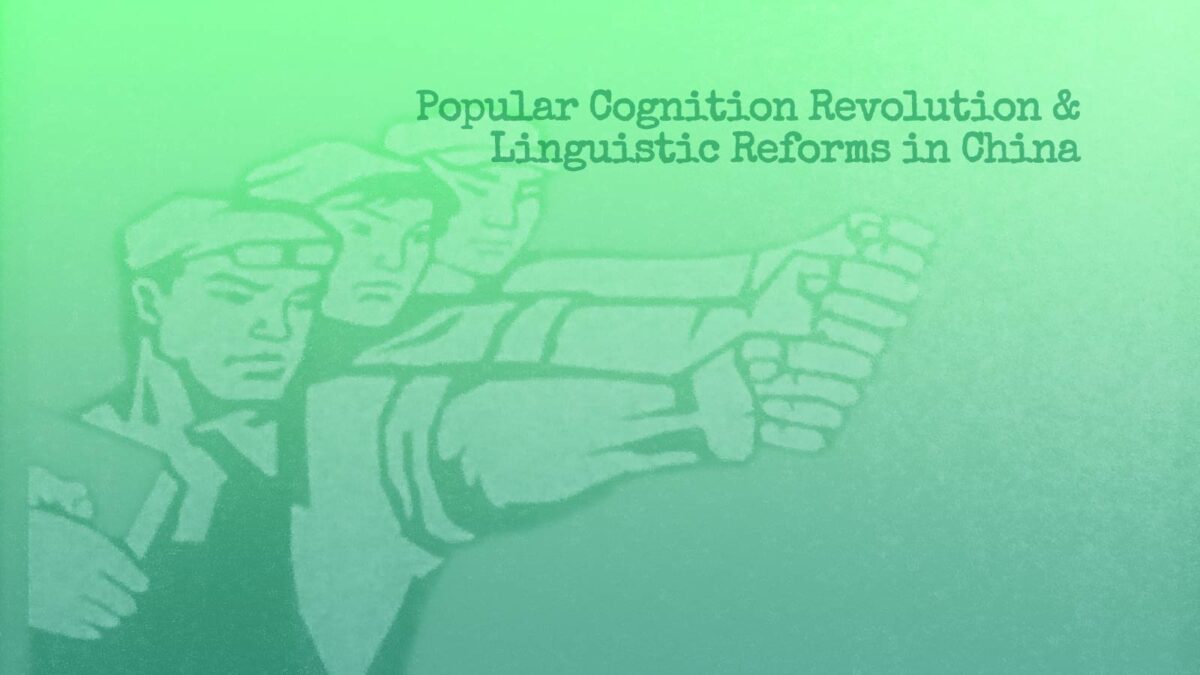In 1949, Communist rule began in China, and throughout the succeeding decades the country was transformed by communist reform. The country’s population had been largely independent of government control until this time, though their economic and political freedom soon became controlled by Maoist transformations. Many liberties were absorbed by the totalitarian cause, though China was mobilized by well-defined and communicated voice of the Communist revolution. The population was convinced most entirely of the righteousness of the Communist cause after the Cultural Revolution, from which point Mao proceeded to utilize the many linguistic reforms of the previous decades. The linguistic reforms had become methods of thought that Mao used to unify the country and eventually overthrow the party, gaining absolute control.
The notion that thought is directly influenced by language is widespread amongst schools of philosophy and cognitive science. A retrospective cognitive analysis of Maoist propaganda and political strategy, offers interpretive context to Mao’s linguistic-political mechanisms, and their affects upon the population. His words and policies widely circulated throughout China; reforms that transcended the individualist society. The Communist party soon unified China, whose majority population participated in China’s unity and Communist cause.
Mao began to influence thought by delineating between economic classes. He began by evaluating the level of potential good for the communist revolution, attributing systematically and universally such revolutionary status. “Classes… were groups divided according to the perceived likelihood that they would support or oppose the Communist cause” (Fengyuan, 68). Poorer peasants and farmers, and those regarded as the lower-middle class, received “good” revolutionary status; the middle class was simply classified as “Middle class.” Upper-middle class and upper class members, landowners, proprietors, were stigmatized with “bad” revolutionary status. Cadres, soldiers institutionalized to educate and enforce revolutionary discourse, were also given “good” status for admirable participation in the revolution. It was well known that those less economically dependent on communism were less inclined towards revolutionary discourse, and less concerned with the well being of the communist party.
During the Cultural Revolution of the 1950s, revolutionary status was the most highly regarded class distinction. Society began to function in new ways, economics no longer a prominent focus. Cadres helped local farming communities with agriculture, whose product was given for national distribution.
The farmers and peasants contributed for the good of the country, their contributions and revolutionary status reflecting their respected level of engagement in the revolution. The wealthy members of China, and their children, were hurt by weak revolutionary status. The negative connotations that came along with “bad” revolutionary status were anti-communist, and were in many cases distinguished as capitalistic. The social status of intellectuals was deduced to that of the middle class, educated members of society were considered independent thinkers and threats to the revolution.
The societal transformations that took place throughout the Cultural Revolution were founded in language, and the people were largely influenced by linguistic reform. Mao went to great lengths to ensure communist discourse was seeping deeply into the minds of society.
“Through the work units, especially, and the neighborhood committees, the Party was able to organize meetings, disseminate propaganda, monitor interpretation of the message and supervise behavior. It was also able to set up political study groups, newspaper reading groups, and radio listening groups, and to establish processes of criticism and self-criticism in small groups (xiao zu). Under these circumstances, the Party had no difficulty in implementing policies of linguistic engineering-ensuring that all city dwellers learned the new revolutionary language and, at least in public, used it in appropriate contexts to say prescribed, politically correct things” (Fengyuan, 55).
The Party observed the population’s reaction to discourse and reinforced or altered their linguistic approach to most affectively reach the population. The Party had monopolized all media sources and utilized them to feed, on a constant basis, propaganda encouraging communist discourse.
Linguistically attributing inferiority to wealthy classes (class distinctions), gave reason to the poorer, to collectively take revenge upon proprietors and the elite.
Many who bore the stigma of lowly revolutionary status saw their demise, an inevitable end to many families that had for decades exploited the lesser fortunate. Through their actions, many became obliged to the collective, unable to dismiss their actions as anything but revolutionary. The class categories were “words [that] had made them revolutionaries, and words made them eager students as the cadres explained the new revolutionary doctrines that rationalized what they had done” (Fengyuan, 71).
Large proportions of illiteracy urged the Party to educate the population, a fruitful attempt that was very successful over years, as their message became more affectively communicated. Radio broadcasts reached even the most distant villages. Constantly shouting slogans, similar to those presented in print, radios presented even the illiterate with propaganda that became inscribed in the minds of the Chinese. New language was introduced via mass communication; new words with new meaning distributed intentionally, whose meanings aimed to inspire hope and participation in the Cultural Revolution.
Peasants were found in distant villages using new vocabulary that would never had been used before 1949. The terms were simplistic, and either attributed good or bad. The Party wished for personal identification with the revolution, and implemented positive terms used in the context of or relating to the movement towards a collective society. The movements were political, though the commonality of implemented linguistics ran throughout the country defining the language of revolutionary discourse.
Woodfield, one who’s contemplated the connection of thought and language, feels that “the contents of ‘high-level’ conceptual thoughts are fixed by the public meanings of the words in which those thoughts are expressed” (Preston, 12). Though individual members of the population were capable of individual thought, as China proceeded through the Cultural Revolution, a transformation of thought processes occurred that unified individual thought. Revolutionary messages were being communicated throughout the whole of China, and mass communication assured that all heard the same message. The interests of the individual became no longer feasible in the collectivist society. Local groups and meetings ensured widespread discourse.
Individuals, most often scholars, were only able to speak through the unifying language of the collective. Public individualism was no longer feasible, linguistically. The societal environment of Communist China contained words and phrases whose pretenses, pertaining to the revolution, were widespread and known commonly by all. Discourse became a prevailing form of communication, and after time the country spoke a language of communist vocabulary and slogans.
Mao’s quotes and sayings became rhetoric, and often controversies were argued with direct quotations. Revolutionary doctrines were widely accepted and subjected as truth, whose implications were the basis of societal functions. Woodfield’s “view of concepts as intellectual norms or social traditions” (Preston, 12), is highly applicable to Communist China, whose thought, with guidance from cadres trained in Maoist thought, was spoken through rhetoric of the revolution. The cadres enforced a “linguistic code of Marxism-Leninism-Mao Zedong Thought [that] was essential… [to] teach people to think in the categories of the new ideology” (Fengyuan, 67).
Mao’s intentional linguistic reforms and implementation of strict discourse directed the thoughts of the individual to that of the collective.
During the Cultural Revolution, the costly implications of revolutionary discord were suffered by many, death sentences or prison became the fates of many who were in discord with or not dependent upon China’s collective. China had together learned the language of Maoist dissertation, and also the doomed fate of those who lay in slight opposition to the cause for which the language spoke. After establishing the linguistics of Communist discourse and thereby defining the revolution, an absolute, the Party was free to take political action to further their interests.
“[One] campaign involved the investigation of more than 450,000 businesses in China’s five largest cities, and it resulted in the execution of about five hundred members of the bourgeoisie, the suicide of another two thousand, the imprisonment of thirty-four thousand, and the imposition of heavy fines on many more… During the campaign, work teams were sent into factories and offices to persuade the workers to “speak bitterness” against their employers and managers—that is, to keep accusing them of unfair treatment, corruption, and graft. The accusations then justified the work teams’ having the owners and managers dragged before denunciation meetings to be attacked and humiliated by their own workers, forced to confess their crimes, and beg the revolutionary masses for forgiveness” (Fengyuan, 71).
Mao and the Communist Party had established, devotion to the revolution. The support that such sociopolitical fidelity gathered allowed the Party to eliminate Communist opposition. China was led by the self-perpetuating revolution that placed its driving Maoist doctrines in the minds of the country. Freely able within the confines of revolutionary action, the Party pursued the collective with little concern for anything else. Little opposition arose from a society whose morals and ideology strayed little from that of the revolution.
Generations born into Communist China after 1949 grew up in a society whose ideology and function had been defined by the Party. The population followed a moral and ethical code that revered the Party above all; sustaining Communism was the collective’s foremost goal. The language of the revolution, over years of implementation, had transformed conceptual thought, to the extent that most everything was conceptualized in relation to the party. The Party used rhetoric in attempts to strengthen personal identification with the revolution. “The extension of the language of love and kinship to the Party, the masses, and the revolutionary people of the world was intended to promote the transfer of emotional attachments to revolutionary objects” (Fengyuan, 83).
The Party had achieved the revolutionary worldview. Thoughts for the better of the collective dominated the concerns of the population. Long periods of linguistic reform and political strategy had taught society to look towards improving upon the collective as a means to solving their problems.
“Once in place, language is not an ordinary learned skill; it is, or has become, a mode of perception… Language is the organ of propositional perception. Seeing sights and hearing sounds does not require thought with propositional content; perceiving how things are does, and this ability develops along with language” (Preston, 22).
The Cultural Revolution was a transformation of thought. Communist propaganda was a means of imbedding Maoist doctrines, while strictly enforced discourse and public standards of revolutionary communication supported them.
Some were more easily persuaded of the righteousness of the revolution than others, typically dependent upon their economic class, though few found refuge outside of the Communist revolution whose language became the basis of society. Language was used pertaining predominantly towards the virtue of the Party and its Communist cause, and this implemented system of linguistics became the dialectic of thought.
Woodfield is correct in pertaining “intellectual norms or social traditions” to that of standard thought. Communist China thought through the collective ideologies that the revolution had defined, the strands that ran commonly throughout the entire country, uniting each member to the overarching and embracing arms of the Communist Party. The Party’s linguistic approach to the Cultural Revolution unified thought by providing and enforcing the language of Communist discourse. The country grew close to the revolution whose slogan they shouted with pride daily. Language had transposed to thought, words and sayings that were ingested by the speaker, who became more loyal to the revolution throughout the period of linguistic reform.
Works Cited
Bostdorff, Denise M. The Presidancy and Rhetoric of Foriegn Crisis. 1stst ed. Columbia, South Carolina: University of South Carolina P, 1994.
Fengyuan, Ji. Linguistic Engineering: Language and Politics in Mao’s China. 1stst ed. Honolulu: University of Hawai’i P, 2004.
Houck, Davis W. Rhetoric as Currency. 1stst ed. Texas: Texas A&M UP, 2001.
Suleiman, Yasir. A War of Words. 1stst ed. Cambridge: Cambridge UP, 2004.

